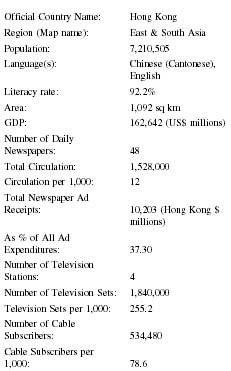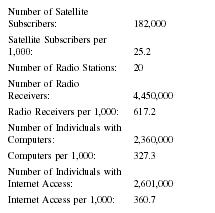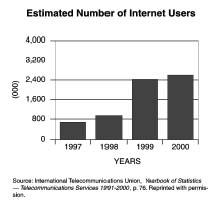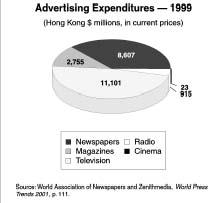Hong Kong
Basic Data

| Official Country Name: | Hong Kong |
| Region (Map name): | East & South Asia |
| Population: | 7,210,505 |
| Language(s): | Chinese (Cantonese), English |
| Literacy rate: | 92.2% |
| Area: | 1,092 sq km |
| GDP: | 162,642 (US$ millions) |
| Number of Daily Newspapers: | 48 |
| Total Circulation: | 1,528,000 |
| Circulation per 1,000: | 12 |
| Total Newspaper Ad Receipts: | 10,203 (Hong Kong $ millions) |
| As % of All Ad Expenditures: | 37.30 |
| Number of Television Stations: | 4 |
| Number of Television Sets: | 1,840,000 |
| Television Sets per 1,000: | 255.2 |
| Number of Cable Subscribers: | 534,480 |
| Cable Subscribers per 1,000: | 78.6 |

| Number of Satellite Subscribers: | 182,000 |
| Satellite Subscribers per 1,000: | 25.2 |
| Number of Radio Stations: | 20 |
| Number of Radio Receivers: | 4,450,000 |
| Radio Receivers per 1,000: | 617.2 |
| Number of Individuals with Computers: | 2,360,000 |
| Computers per 1,000: | 327.3 |
| Number of Individuals with Internet Access: | 2,601,000 |
| Internet Access per 1,000: | 360.7 |
Background & General Characteristics
Hong Kong is a Special Administrative Region (SAR) of the People's Republic of China with a high degree of autonomy in all matters except defense and foreign affairs. On July 1, 1997, China resumed sovereignty over Hong Kong, ending more than 150 years of British colonial control. In 1984, Great Britain and China signed the Sino-British Joint Declaration, which, combined with Chinese laws enacted in 1990, provided a high degree of economic autonomy for the SAR for 50 years beyond 1997.
Hong Kong is located on the southeast coast of China. It consists of 236 islands and islets and a portion of the Chinese mainland, with a total area of approximately 1,046 square kilometers. Hong Kong Island is one of the leading trading centers in the world and constitutes the SAR's principal business and commercial center. Shipping and trade are major aspects of its economy. Tourism is one of Hong Kong's most important service activities and is the third largest source of foreign exchange earnings.
Hong Kong residents have a vast appetite for news. Their press, radio and television industries enjoy freedom from pre-censorship and minimal regulation. The Hong Kong government treats the press as a private enterprise. It has no specific regulatory body to control the media and implements no other form of direct control over the press. In this respect, Hong Kong continues to follow the colonial press regulation, which is still under debate and comes up for discussion from time to time.
Cultures of the East and the West meet in Hong Kong. Although 95 percent of the population is of Chinese

Nature of the Audience
Hong Kong has an affluent population. Although Hong Kong is the most expensive city in the world, its prosperous economy is reflected in the lifestyle of its people, who have the highest standard of living in all of Asia. Asiaweek ranked Hong Kong as Asia's seventh best city in the world on a "quality of life" index.
There are about 7.2 million people in Hong Kong. About 1.3 million live on Hong Kong Island, around 2 million in mainland Kowloon, and the remainder in the New Territories and Outlying Islands. Almost 96 percent of the population is ethnic Chinese and 4 percent are other ethnic minorities, including a wide range of nationalities. Hong Kong is one of the most densely populated areas of the world, with an overall density of some 6,300 people per square kilometer. A British colony for 156 years, Hong Kong became a Special Administrative Region of the People's Republic of China on July 1, 1997.
There are several languages spoken in Hong Kong. The most common languages used in Hong Kong now are Cantonese and English, but as a result of the transfer of

Hakka language; Minnan dialect, also known as Southern Min, Fukienese, Taiwanese, Amoy, Chaozhou/Tiechew, Shantow/Shahtaw; and Fuzhou dialect, also known as Northern Min or Northern Fukienese.
In addition, the characters in which Chinese is written in Hong Kong differ from those used in mainland China. Despite linguistic difficulties, literacy in Hong Kong is high: in 1998, 92.2 percent of people over the age of 15 in Hong Kong were literate.
Freedom of expression and a liberal attitude towards the press have helped to attract a concentration of prestigious international publications to Hong Kong. International publishers operating in Hong Kong manage the production, marketing and distribution of books for the Hong Kong market and export to related companies worldwide. Hong Kong printing exports amounted to over US $1 billion in 2001.
About 120 major international publishers of newspapers, magazines and books have their offices and Asian headquarters in Hong Kong, which is also the base for a number of regional publications. For example, Asiaweek , the Far Eastern Economic Review , the Asian Wall Street Journal, the Financial Times , The Economist and the International Herald Tribune are printed in Hong Kong.
International book publishers in Hong Kong include Oxford, Longman, Readers' Digest and Macmillan. In recent years, more foreign titles have been translated into Chinese, including management, personal finance and self-improvement books as well as cartoons and popular novels, especially those that have been adapted for movies or television.
Media Circulation
There are a total of 54 newspapers in Hong Kong. Of these, 32 have a circulation of 2,951,000 (1993). According to the Hong Kong Government Information Center, there are 697 registered periodicals and 54 newspapers in Hong Kong. Of the 54 newspapers, 34 are in Chinese and 11 in English. UNESCO (1999) data shows that in 1996 Hong Kong published 52 dailies with a circulation of 5 million—a penetration of 78.6 copies per 100 people.
Of other non-newspaper periodicals, 347 are in Chinese, 155 in English, 115 bilingual and 17 in other languages. These magazines cover a wide variety of subjects from public affairs and politics to technical matters and entertainment.
Major newspapers circulated in Hong Kong include the following:
- Hong Kong Standard Front Page
- Hong Kong Standard China Section
- South China Morning Post (SCMP) Internet Edition
- South China Morning Post China Section
- China Business Round Up
- Ming Pao Daily News
- Hong Kong 97 Website
- Sing Pao Daily News
- Ta Kung Pao
- Hong Kong iMail
- Apple Daily Online Newspaper
- Hong Kong Commercial Daily
- Wen Wei Po Daily
- Sing Tao Electronic Daily
Of some 40 daily newspapers in Hong Kong, five are in English, including the South China Morning Post (circulation 101,000) and the Hong Kong Standard (circulation 60,000). The daily newspapers have a combined readership of over 400,000. Approximately 80 percent of the readers are Chinese. Hong Kong has the highest news readership in Asia after Japan.
Hong Kong newspapers are divided into sections— e.g., editorials, politics, education, transportation and real estate. Some newspapers cover mainly general news, both local and overseas; others cover solely entertainment, especially television and cinema news. Chinese and English newspapers belong to the Newspapers Society of Hong Kong, which was formed in 1954 and acts in the interest of the ownership, management and reader-ship of the newspapers. Specialized periodicals, the other main sector of the press, cover a wide variety of subjects from public affairs and politics to technical matters and entertainment.
Press History
Hong Kong's press history has deep roots and a close connection with Chinese politics. The British colonies of Shanghai and Hong Kong were the birthplaces of the modern Chinese press. In the 1850s, Christian missionaries first published a Chinese edition of the English language newspaper. A Chinese-owned newspaper press followed in the 1870s. At the turn of the century, both Manchurian loyalists and revolutionaries published their propaganda in Hong Kong; they aimed to reach the Chinese intellectuals on the mainland, not just to provide news but to promote enlightenment and advocate reform or revolution. There was no explicit censorship, and citizens were allowed to criticize the contending Chinese regimes, although negative discussion of the British colonial government was discouraged. After the 1967 communal riots, the colonial government felt a strong need to close the communication gap with the people. It upgraded the Government Information Services (GIS) to play the double role of news producer and news distributor to the press, both controlling and facilitating press access to government information.
When China and Britain held negotiations in the early 1980s over the future of the colony, a majority of the Hong Kong press sided editorially with the British position and cast serious doubt about the "one country, two systems" policy proposed by the Chinese regime. From 1984 to 1997, the press had to cope with the dualistic power structure of the colonial regime and the Chinese authorities. Throughout the 1990s, the Hong Kong press largely supported Britain's last effort to undertake democratic electoral reforms. Under the basic press law, China must allow Hong Kong to continue its present way of life, including press freedom, for at least 50 years.
In 1997, 30 Chinese dailies, 10 English language dailies, one bilingual daily and four dailies in other languages had registered with the Hong Kong government. Excluding those publications covering only entertainment or horseracing, as well as news agency bulletins registered as newspapers, Hong Kong published 15 large circulation dailies in 1999. Some dailies have distribution networks and print editions overseas, particularly in the United States, Canada, the United Kingdom and Australia. Some regional publications, such as the Asian Wall Street Journal , Asiaweek , the Far Eastern Economic Review and the International Herald Tribune , have chosen Hong Kong as their base or printing location. Many international news agencies, newspapers, and overseas broadcasting corporations have established regional headquarters in Hong Kong because of its advanced telecommunications infrastructure and the availability of the latest technology, as well as its strategically important location in Asia.
In the past, Hong Kong was known for a large number of small, diverse, family-owned newspapers. However, the new publishing economies, as symbolized by the Apple Daily, has made it difficult for smaller newspapers to survive. Newspaper publishing has become the prerogative of those individuals or corporations with substantial economic means.
Hong Kong is a regional publishing center, backed by a highly developed printing industry. Advertising sales are a major source of revenue for the printed media.
Economic Framework
Hong Kong is the world's tenth-largest trading entity and the ninth-largest banking entity, and is one of the world's most open and dynamic economies. Its unique social system, its reputation for hard work and its strategic location combine to produce a bustling free market economy, though one highly dependent on international trade.
Hong Kong has very few natural resources and must import virtually all its raw materials; thus, it is extremely vulnerable to external influences by its trading partners. Recently, Hong Kong has achieved rapid economic growth. Traditionally, manufacturing industries, shipping, banking and tourism have been the major foreign currency earners. Textiles, clothing, toys, electronics and plastic industries employ a large percentage of the work force and contribute significantly to the GDP, accounting for some 70 percent of total domestic exports. As a gateway to China—and now as China's window to the outside world—Hong Kong is developing into a service-oriented financial center. Its active banking sector and the stock market provide the financial and administrative support for investment ventures in China.
Government policy encourages free enterprise and foreign investment. No distinction is made between local and foreign investment, and both are welcomed. Hong Kong's main trading partners are the USA, the UK, Germany, China and Japan, and the primary products are fish, fruit and vegetables. Major industries in Hong Kong include aircraft engineering, clothing, clocks and watches, electronic goods, fishing, finance and banking, iron and steel rolling, plastic products, ship repair, textiles, and toys.

Hong Kong's press is an amalgamation of privately owned and party-financed newspapers. Most newspapers in Hong Kong are owned by private investors whose main goal is profit. Contrary to widely held predictions, Hong Kong has continued to enjoy a high degree of press freedom as China seems to have kept its promise of not interfering with the SAR's internal matters.
Surveys indicate that journalists as well as citizens have perceived steady erosion in media credibility in the 1990s. In fact, many outlets like the prestigious South China Morning Post and Ming Pao Daily News have lost significant ground. Press freedom is likely to erode seriously without conscious measures to safeguard press integrity.
In 1999, the newspapers' share of display advertising revenue was 36 percent. Only television had a higher share, with 45 percent.
Press Laws
Hong Kong's press freedom is said to be the highest in Asia, except for Japan. Newspapers have enjoyed a high degree of freedom perhaps because of the British tradition. Although the colonial government had a number of laws in hand to control the press, it seldom used them.
The basic law provides for freedom of speech of the press and of publication and there was no apparent change after the Chinese takeover in the tradition of respect for these freedoms by the government. In the early 2000s, there were some instances of intolerance on the part of Chinese authorities regarding press freedom. It is perhaps ironic that in the year 2001, the Hong Kong media was affected less by political events and more by an economic slump. This has forced the closure of one publication and the slimming down of several others. Such moves have an inevitable impact on media diversity.
Censorship
There is a widespread impression among both journalists and the public that it is prudent for the press to engage in a degree of self-censorship. The pressures on journalists to self-censor usually are subtle and indirect. There is a perception of rising censorship in Hong Kong because it is a major business center where economic and political information is sensitive. Self-censorship is more pronounced on issues considered sensitive to the Chinese leadership. These include coverage of Chinese dissidents and Tibetan and Xinjiang separatists, as well as the inner workings of the Communist Party. These issues are reported upon, but reporters tend to play it safe. There are no reports of direct orders to refrain from covering a certain issue, despite a shared perception of a need for special care towards topics of particular sensitivity to China or to Hong Kong's powerful business interests.
There is no censorship of imported videos at all; the government takes the view that these are for private viewing only and not for public consumption. There are no changes to this policy planned.
News Agencies
The domestic news agency in Hong Kong is the Hong Kong China News Agency (HKCNA). HKCNA was established on November 13, 1956, in Hong Kong and offers news releases to Chinese-language newspapers in Hong Kong, Macao and foreign countries and articles for newspaper supplements. HKCNA is a regional agency that offers about 30 dispatches for over 80 clients every day covering news in the Mainland, Hong Kong, Macao, Taiwan, and Chinese communities abroad. HKCNA is a branch office of the China News Service and carries the news of both agencies.
Broadcast Media
Virtually all Hong Kong households, about 2 million, have access to television. Altogether, the TV industry provides more than 38 channels. The television stations in Hong Kong operate four channels: all commercial, two Chinese and two English. Hong Kong is also the home of major regional broadcasters, including Satellite Television Asian Region Ltd. (STAR TV), Chinese Television Network (CTN) and Chinese Entertainment Television (CETV).
Television Broadcasting International (TVBI) markets about 1,000 hours of its 2-3,000 hours of productions in 25 countries serving overseas Chinese communities. Asia Television (ATV) markets 520 hours of drama, showing 10 hours per week on air.
Radio and Television Hong Kong (RTHK), a quasi-public broadcaster, supplements commercial television. It is a government broadcasting authority, which places its programs on the other four channels. News is broadcast through Radio-Television Hong Kong and can be heard in English and Cantonese. Cantonese radio and TV programs are broadcast from Hong Kong. Recently, there have been some TV programs in Mandarin.
Education & TRAINING
The Chinese University of Hong Kong has accredited journalism and mass media programs, which are supplemented with a required period of practical training in the field. Hong Kong has many schools and colleges providing courses in mass media and journalism, which offer excellent career opportunities. Journalism and media programs aim at training students' analytical ability, independent thinking, and proficiency in language and literacy in various forms of media. The university academic program stresses both theoretical and professional training. There are five professional tracks: journalism, broadcasting, advertising and public relations, multimedia and telecommunications, and communications studies. The program's rigorous training also equips students with high adaptability and professional competence.
Summary
The Hong Kong press has remained healthy and diverse despite facing competition. Because of its diversity, the press maintains high quality and high credibility and hence appears to have a bright future.
Freedom House has ranked Hong Kong as partly free regarding governance, political rights and civil liberties. Hong Kong remains a capitalist society with the government firmly wedded to a laissez-faire policy on commercial activities. After the 1997 transfer to China, the press has continued to be more vocal than most people had envisaged. However, it remains to be seen whether this trend will continue indefinitely. A threat to press freedom in recent years has been the many libel suits filed against media organizations and critics. This in effect may dampen the critical exchange of ideas and public monitoring of the press. Broadcasting regulations at the highest level rest with the Chief Executives and the advisory bodies. Under the name of market-driven journalism, yellow journalism has become the order of the day for the popular press and for some so-called "info-attainment" TV programs.
The decline in media ethics is evident in the growing number of complaints that people have lodged with the government monitoring body. The recent economic downturn and the fierce market competition have been another major issue in Hong Kong. As a matter of survival, many newspapers have lowered their editorial standard to attract the largest possible number of readers by offering sensational content. Intense market competition may also lead to folding of newspapers that will further narrow the spectrum of opinion.
Another danger to the Hong Kong media comes from the profession itself. The Hong Kong Press Council, which was set up by the Newspaper Society in July 2000 to consider complaints from the public about media invasion of individual privacy, announced in October that it wished to turn itself into a statutory body for protection from non-member newsgroups.
In terms of media freedom, there have been few noticeable differences since the British colonial rule in 1997. By and large, the media is free and adequately fulfils its role as a public watchdog. However, several political and corporate forces are critical of the independent media and see it as a threat or an inconvenience. Through varied means, many are intent on curtailing the activities of the press. Beating back their advances will take a vigilant and concerted effort.
Bibliography
Atlapedia Online . Latimer Clark Corporation Pty. Ltd., 2001. Available from www.atlapedia.com .
Bale, Cliff. World Press Freedom Review, 2001. Available from www.freemedia.at/wpfr/hongkong.htm .
Goff, Peter. World Press Freedom Review, 2000. Available from www.freemedia.at/wpfr/hongkong.htm .
Gunaratne, Shelton A., ed. Handbook of the Media in Asia . New Delhi: Sage, 1982.
U.S. Department of State: Bureau of East Asian and Pacific Affairs. "Background Note: Hong Kong." Available from www.state.gov/r/pa/ei/bgn/2747.htm .
Ashakant Nimbark
Binod Agrawal
Thank you,
A. Lawson